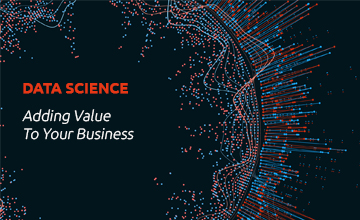In today’s rapidly evolving business landscape, enterprises constantly seek innovative ways to enhance their efficiency, productivity, and competitive advantage. One technology that has emerged as a game-changer is Artificial Intelligence (AI). By utilizing the power of AI, businesses can revolutionize their operations and empower business process automation.
This blog discusses how AI is transforming enterprises and driving significant advancements in business process automation.
What is artificial intelligence (AI)?
AI helps in developing intelligent machines that can perform tasks that typically require human intelligence. This technology encompasses various techniques, including machine learning, natural language processing, computer vision, and more. By leveraging these capabilities, it enables enterprises to automate complex tasks, analyze vast amounts of data, and make informed decisions in real time.

One of the primary areas where artificial intelligence is making a significant impact is business process automation. Traditionally, enterprises have relied on manual processes and human intervention to carry out various tasks. These processes are often time-consuming and error-prone, resulting in bottlenecks and inefficiencies. However, with the advent of AI, enterprises can automate these processes, streamline operations, and achieve remarkable improvements in productivity.
Benefits of AI-powered business process automation
- Handling repetitive and mundane tasks:
One of the significant advantages of AI in business process automation is its ability to handle repetitive and mundane tasks. Many routine activities, such as data entry, invoice processing, and customer support, can be automated using artificial intelligence. By delegating these tasks to such systems, enterprises can free human employees from mundane work, allowing them to focus on more creative and complex activities. This improves job satisfaction and enhances overall productivity within the organization.
- Enabling employees to focus on higher-value activities
By automating repetitive tasks, AI empowers employees to shift their focus to higher-value activities that require human creativity, problem-solving, and strategic thinking. Instead of spending time on manual data entry or processing, employees can engage in more critical tasks such as developing innovative enterprise mobile apps, analyzing complex business problems, and fostering customer relationships. The ability to leverage it for business process automation enables enterprises to tap into the full potential of their human workforce and drive innovation within the organization.
- Improving productivity and efficiency
AI-powered business process automation significantly enhances productivity and system efficiency. It can perform tasks at a faster rate and more accurately than humans. It also eliminates errors and reduces processing time. artificial intelligence algorithms can analyze vast amounts of data in real-time, extracting valuable insights to drive informed decision-making. This capability enables businesses to optimize operations, identify bottlenecks, and streamline workflows for improved efficiency. By automating processes and leveraging AI’s analytical capabilities, enterprises can achieve higher productivity levels and gain a competitive edge in the market.
It plays a powerful role in business process automation. Its key techniques, such as machine learning, natural language processing, and computer vision, enable enterprises to automate repetitive tasks, helping in freeing up employees to focus on higher-value activities such as enterprise app development.
- Leveraging AI for data analysis and decision making
Data plays an important role in business operations. Enterprises generate vast amounts of data from various sources, including customer interactions, sales transactions, supply chain information, and market trends. This data holds valuable insights that can drive strategic decision-making, optimize operations, and improve business outcomes. However, manual analysis of such vast quantities of data is time-consuming, prone to errors, and often unable to uncover hidden patterns or trends.
Role of AI in analyzing vast amounts of data
- Real-time data processing and analysis
AI excels at processing and analyzing large volumes of data in real time. Using advanced algorithms, its systems can quickly sift through data, identify patterns, and extract valuable insights. Real-time data processing enables enterprises to make timely decisions, respond to market changes promptly, and gain a competitive advantage. Whether it’s monitoring customer behavior, tracking inventory levels, or analyzing social media trends, it can process data at lightning speed, providing businesses with up-to-the-minute information for effective decision-making.
- Extracting insights from data
AI algorithms have the ability to uncover hidden patterns, correlations, and trends within complex datasets. By leveraging machine learning techniques, it can identify relationships that may not be apparent to human analysts. This enables businesses to extract actionable insights from data and understand their operations, customers, and markets better. AI-powered data analysis can reveal valuable information about customer preferences, demand patterns, cost-saving opportunities, and potential risks. This empowers enterprises to make informed decisions and optimize their strategies.
- Making data-driven decisions and optimizing operations
AI enables enterprises to leverage predictive analytics and forecasting to predict future trends and outcomes. Its algorithms can generate accurate predictions and forecasts by analyzing historical data, market trends, and other relevant factors. This helps businesses anticipate customer demands, optimize inventory levels, and make proactive decisions. For example, artificial intelligence can analyze past sales data to predict demand patterns and automatically adjust production levels accordingly. Predictive analytics empowers enterprises to stay ahead of the competition, optimize resource allocation, and minimize risks.
- Optimizing inventory levels and resource allocation
AI-powered data analysis can provide valuable insights into inventory management and resource allocation. Its algorithms can optimize inventory levels to avoid stockouts and excess inventory by analyzing supply chain operations, sales trends, and customer behavior. This reduces costs, minimizes waste, and ensures efficient resource allocation. It also helps identify areas where resources can be reallocated or optimized, improving operational efficiency and enhancing overall performance.
Leveraging AI for data analysis and decision-making revolutionizes how enterprises optimize operations and make informed choices. It’s ability to process vast amounts of data in real-time and extract insights enables businesses to stay ahead of the curve.
Conclusion
As we reflect on the potential of AI in revolutionizing enterprises, it is clear that the possibilities are immense. AI can transform every aspect of business operations, from customer service to risk management. However, it is important to implement AI ethically and responsibly, addressing concerns around privacy, bias, and transparency. Responsible AI practices will ensure that the benefits of AI are utilized while maintaining trust and credibility.
The transformative power of artificial intelligence allows businesses to optimize operations, enhance productivity, and make data-driven decisions when utilized effectively. By embracing it, enterprises can gain a competitive edge in the dynamic business landscape and position themselves for success in the future. The potential of AI to develop enterprises is vast, and its impact will continue to shape business operations in the years to come.






